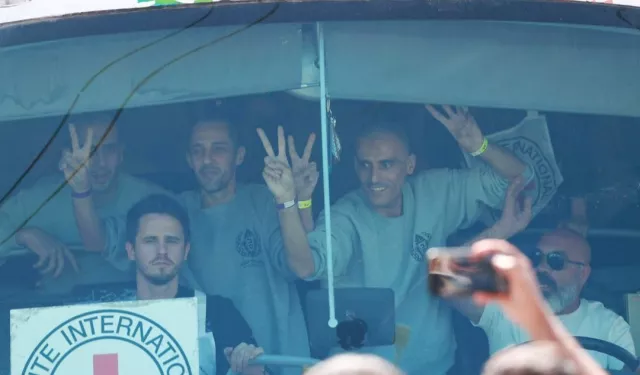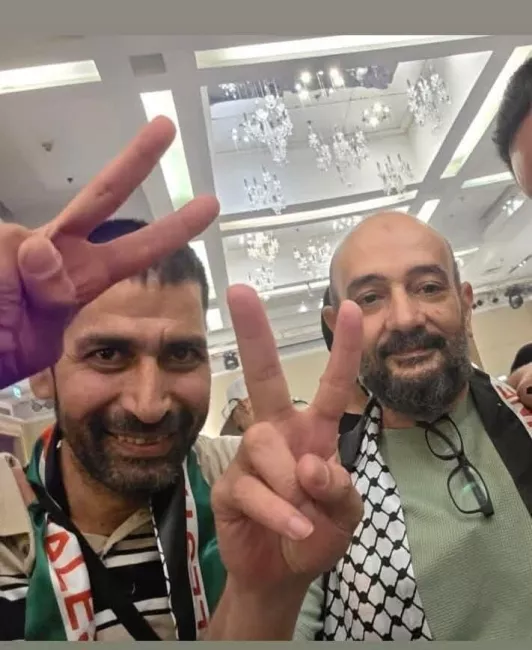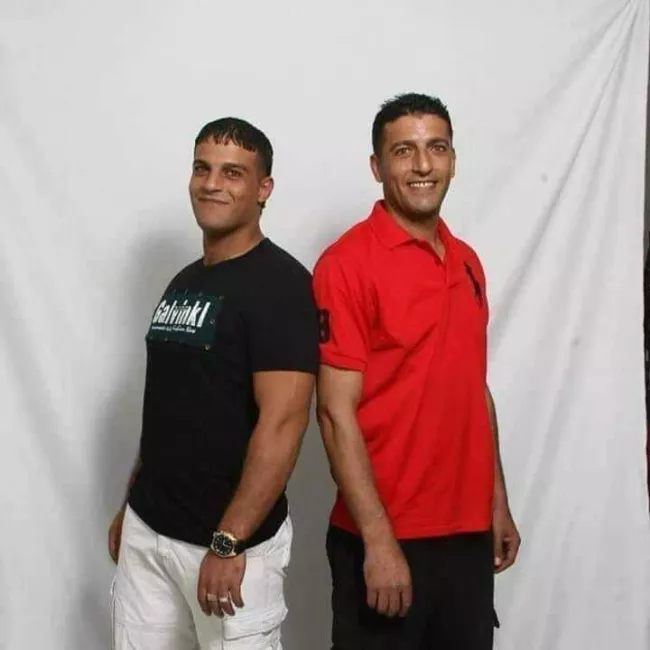
Nazism, exile, and touchscreens: In Cairo with freed Palestinian prisoners
“It’s like I’ve had a blow to the head,” said freed Palestinian prisoner Ashraf Hanaysha, describing the disorientation since his release from the Israeli gulag under the recent agreement for a ceasefire in the Gaza Strip and his subsequent exile to Cairo.
Hanaysha is still trying to make sense of his new reality. “I don’t even know how to use this phone. How am I supposed to deal with the world?”
He was just 24 when Israeli occupation forces arrested him in 2006 for killing an Israeli settler in Jerusalem. One of dozens serving life sentences, he was released on the condition of being expelled from Palestinian territories. He walked out of prison 19 years later, to displacement.
Hanaysha arrived Cairo on Oct. 14 as part of a group of 154 freed prisoners deported from Israeli prisons. Al Manassa met him at the Renaissance Cairo Mirage City Hotel, a Marriott property, where he was initially housed. Days later, Egyptian authorities transferred the group to another hotel after the Daily Mail published a report featuring photos of the prisoners inside the premises, claiming they pose a risk to tourists.
Throughout the two hours we spent with him, Hanaysha maintained a quiet composure, even as he recounted the ordeals endured inside the occupation’s prisons. He lit a cigarette, and we sat together in a quiet corner of the hotel’s garden. Nearby, other freed men gathered in small groups, while officials overseeing the prisoners’ affairs wrapped up remaining procedures.
We were joined by Kamel Atatreh, from Jenin, who was freed after spending roughly 23 years in Israeli prisons, most of them in Gilboa following his arrest in 2003 for killing two Israeli settlers. During his years in prison he lost both his mother and brother. The occupation denied him the chance to bid a final farewell to either.
A little later we were joined by freed prisoner Akram Hamed, one of the most prominent leaders of the Fatah-affiliated Al-Aqsa Martyrs Brigades. He was responsible for a series of shootings between 2002 and 2004 around Ramallah, one of which resulted in the deaths of settlers. Hamed was arrested in 2004 and sentenced to three life terms. His release came as part of the prisoner exchange and ceasefire agreement between Israel and Hamas last January.
Nazi prisons
Palestinian prisoners are tried in military courts, and under that Israeli legal system, a life sentence means no possibility of release. “If a prisoner dies, they keep his body to release it in deals with the resistance,” Hanaysha said.
“Life imprisonment” is the severest penalty in the Israeli penal code after the death penalty. In Hebrew it is known as "maasar olam", which means imprisonment forever.
All three freed men agreed that for all the abuse and brutality they endured in Israeli prisons, nothing compared to what came after October 7.
“Those sons of bitches broke two of my ribs about three weeks before I was released,” Hanaysha said, pointing to his chest.
Recounting their version of Oct 7, he recalls waking up early that day when suddenly the TV began airing footage of fighters inside a kibbutz. “I didn’t understand what was happening because I don’t know Hebrew well, but I felt something big was going on. I woke up my cellmate who knows Hebrew. He said there was an attack, hostages, dead, and wounded.”
“We expected the Israeli reaction to be brutal, but not to that extent,” said the freed prisoner, referring to the genocidal war that the Israeli occupation army has waged on Gaza over the past two years.
A new phase began in prisons. All recreational items were taken from the cells, along with utensils like spoons and plates. “The quantity of food was reduced and food became mostly under-cooked. Rice with boiling water poured over it, that’s all,” Hanaysha said, noting that the prisoners lost a lot of weight over the past two years and some became emaciated.
“For two years they wouldn’t even let us drink tea. They banned sugar and fruits, and deprived us of personal hygiene supplies,” Attatra said.
Hamed recalled the beatings, torture, and systematic abuse they were subjected to. “Their goal is to humiliate and break us. Suddenly the soldiers would storm in with attack dogs and batons, beat us for 10 or 15 minutes, and then leave.”
“They swear all the time and humiliate everyone—old or young, sick or healthy. They don’t consider us human beings in the first place.”
On Sept. 17, the United Nations Office of the High Commissioner for Human Rights/OHCHR in the Occupied Palestinian Territories said Israeli authorities had “deliberately imposed conditions of detention that amount to torture or other forms of ill-treatment and that have contributed to the deaths of detainees.”
OHCHR said that at least 75 Palestinians, including a child of 17, died in Israeli places of detention between Oct. 7, 2023, and Aug. 31, 2025. Of these, 49 were from Gaza, 24 from the West Bank, and two were Palestinian citizens of Israel.
Resistance through study and games
To say that prison conditions worsened after Oct. 7 does not mean they were good before, but they could be described as “stable,” according to Hamed, who spoke Egyptian Arabic with a Palestinian accent.
“We became familiar with the red lines. The occupation often factors prisoners into its calculations, because a small problem in any wing can cause a big crisis in the whole prison and even bring protests outside. They don’t want that hassle.”
“We play a game of cat and mouse with them,” Hanaysha said, describing how prisoners outmaneuver the soldiers. “When they banned pens and paper after Oct. 7, we used cellophane to make a pen, and we wrote on food wrappers. So they banned cellophane and food wrappers. Then we carved on the walls, so they came and smashed the walls.”
Hamed spoke of the weight of time inside the occupation’s prisons. “All we have is resistance — so we don’t die crushed.” He described the ways they invented to keep their spirits alive.
“For example, we made a chess set out of plates and held tournaments inside the wing. But of course, the moment a soldier saw us playing, he’d barge in like a child, stomp on the pieces, and punish us.”
Hamed also spoke of prisoners who clung to hope through study and education.
“Many of us relied on our lawyers or families to correspond with universities, in Palestine or abroad, so we could continue our education.”
Hanaysha was one of them. He completed high school and a bachelor’s degree despite the occupation’s attempts to prevent him from continuing his education. He is currently seeking a master’s in social sciences from Al-Quds Open University.
A number of prisoners also discovered they had a talent for writing poetry, novels, and short stories. “We held cultural sessions where a prisoner would recite a poem and we would discuss and critique it,” Hamed said.
Many prisoners had published literary works, among them freed prisoner Basim Khandaqji. He was arrested in 2004, began writing in prison, and in April 2024 won the International Prize for Arabic Fiction (the “Arabic Booker”) for his novel “A Mask, the Color of the Sky.” Attatra recalled his achievements with pride.
He also mentioned freed prisoner Kamil Abu Hanish of the Popular Front for the Liberation of Palestine, who spent about 22 years in prison. He was sentenced to nine life terms and 78 years, but he did not surrender. From his cell Abu Hanish published 16 books spanning narrative works and poetry collections.
My brother, but…
Atatreh laughed the moment the conversation turned to members of the Druze community who serve in the Israeli army, then he shared a story.
“We had a Druze jailer. As long as the Jewish soldier was standing there, he treated us terribly — insults, humiliation, even beatings. But the moment the Jewish soldier walked away, the Druze would hug me and say, ‘You’re my brother. I’m a Palestinian like you. But I’m just doing my job — and if I don’t act like that in front of the Jew, I’ll be in serious trouble.’”
Hanaysha cut in.
“The Druze guard told me, ‘No matter how much I insult you in front of the Jew, don’t respond — because if he orders me to beat you, I’ll beat you. And if he orders me to kill you, I’ll kill you.’”
Hanaysha emphasized that Druze soldiers made it clear that there were explicit orders to mistreat Palestinian prisoners.
“They told them, ‘We want you to behave like Nazis.’ I saw it with my own eyes. A Jewish soldier beat a prisoner and shoved a gas grenade into his mouth. The prisoner died.”
Israel has 32 prisons and detention centers, all under the administration of the Israel Prison Service, known by its Hebrew acronym, Shabas. About twenty of them hold Palestinian prisoners; the rest are for Israeli criminal inmates.
The cell regime
Prisoners organize themselves by electing representatives. Hanaysha explained that each prison is divided into wings, and each wing has a “dovair,” a Hebrew word meaning spokesman.
From among the wing representatives, one is chosen to communicate with the prison administration, submit prisoners’ requests, and negotiate their rights. Committees are also elected in each prison to manage prisoners’ affairs.
Hanaysha noted that prisoners spend long stretches behind bars with no hope of release through legal means. They expect to remain, so they work on organizing their lives.
Attatra described the "urfi" (customary) judicial system inside the occupation’s prisons.
“Because the prisoners are in one place for years, naturally problems and disputes arise among them. That’s where the customary court comes in.”
He offered an example: if one prisoner has assaulted another, the elected court would convene, hear both sides and witnesses, and then issue what it deemed a just ruling. Punishments ranged from reprimand and censure to physical punishments such as beatings, or addressing the prison administration to transfer the offender to another prison.
Among the methods of abuse used against prisoners, he added, is canceling the dovair system and the committees that organize prisoners’ affairs.
The high cost of freedom
Laughter and a generally upbeat mood prevailed during our time with the freed prisoners until we asked them about the price that was paid to free them.
Hanaysha said he still can’t grasp what happened, and that every day he feels profoundly guilty about the children and women “who lost their lives along the road to liberating our country.”
“Genocide has no justification, and I’m sad that the price of our release from prison was all those martyrs—children, women and men—and destruction that I never imagined,” Attatra added.
None of the three expressed regret or second thoughts about having killed settlers. “Resistance is our right. By every norm, the occupier must be fought until they leave,” Hanaysha said.
What worries the freed prisoners, however, is the lack of organization within the resistance. Attatra pointed to events in Gaza after the ceasefire, including the killings of those Hamas describes as “traitorous collaborators.”
“We in Fatah made the same mistake after the Intifada,” he said.
He believes that instead of this state of revenge, priority should go to institution-building and bringing life back to Gaza, then referring those individuals to trial and punishing them if they are indeed convicted. But killing them in this way “is terrifying.”
Hanaysha has been unsettled since he left prison. He is still trying to discover the world around him. It was obvious in how he handled the smart phone he received after his release.
The freed prisoner revealed that he was informed his stay in Egypt is a transitional period before he goes to a third country. But for now he does not know where. He noted that none of the prisoners expelled to Egypt know their next destination.
Hamed said the same. The prisoners hear of many countries they might move to—Turkey, Malaysia, Indonesia, Spain—“but we don’t know exactly where they will take us.” He added that the Egyptian authorities do not force anyone to leave the country; on the contrary, they are “treating us with great respect.”
Despite his worries about what awaits him, Hanaysha has not lost hope that he will marry, have a family, and one day return to his homeland, Palestine.
“The one who brought me out of the darkness of the worst prisons is able to bring me back to my homeland one day.”


